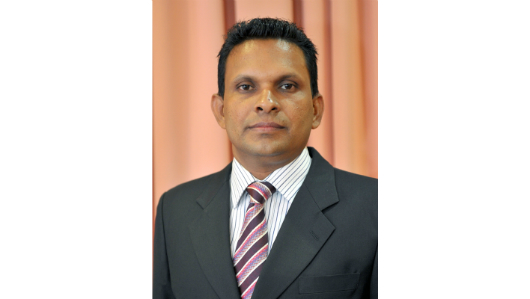The Maldives Police Services have refused an independent medical examination of former President Mohamed Nasheed, the Human Rights Commission of the Maldives (HRCM) has alleged.
The opposition leader, currently in pre-trial detention, claimed he had sustained injuries when police manhandled him and dragged him into the court on Monday prior to the first hearing of a sudden terrorism trial.
Nasheed limped into the courtroom with his arm in a makeshift sling
HRCM Secretary General Shamoon Hameed told local media that a team from the HRCM had gone to Dhoonidhoo detention center on Monday night with a doctor, but police refused the commission’s request for the independent examination.
The HRCM law empowers the commission to visit places of detention without prior notice.
However, the police have denied Nasheed sustained any injuries with Superintendent Hamdhoon Rasheed telling the press last night that an X-ray taken of Nasheed’s shoulder at the doctor’s request did not reveal any injuries.
“Further, doctors have assured us that President Nasheed did not sustain any injuries,” Rasheed said.
Rasheed also condemned the HRCM for issuing a statement “immediately after the incident” in which the commission condemned the disproportionate use of force against the former president.
The commission said it was “investigating the police’s brutal treatment of the former president.”
“We will accept constructive recommendations by the Human Rights Commission about operations conducted by police,” Rasheed said.
”However, condemning our work without an investigation is unacceptable.”
The police ‘use of force review committee’ was also conducting an investigation to determine if excessive force was used, Rasheed revealed.
Meanwhile, Hameed defended the HRCM’s prompt statement, stating that the commission believed police acted harshly towards the ex-president.
Speaking to reporters after a visit to Dhoonidhoo, Nasheed’s wife, Laila Ali, said doctors had recommended the former president undergo a week’s physiotherapy for a shoulder injury.
A police spokesperson confirmed Nasheed had seen a doctor at Medica Clinic in Malé at 2:20pm on Tuesday (February 24). Neither his family nor lawyers were informed.
Right to legal representation
The international community expressed concern over the manhandling of Nasheed as well as the denial of legal representation in his first trial held on February 23. Nasheed was charged with terrorism over January 2012 arrest of the Criminal Court Chief Judge Abdulla Mohamed.
On Monday (February 23), the Criminal Court informed Nasheed’s lawyers that they had to register at the court two days in advance despite being unaware of the trial until the former president’s arrest the previous day.
Hassan Latheef from Nasheed’s legal team Hassan Latheef told Minivan News today that three out of four lawyers on the team have now been registered to represent the former president in the second hearing scheduled for 8:00pm tonight.
Latheef said police informed the lawyers today that they could only meet Nasheed at the Dhoonidhoo detention centre after 1:30 pm.
“After many requests and arguments, the police finally allowed lawyers to meet Nasheed in Dhoonidhoo”, Latheef said.
Latheef explained that lawyers were normally allowed to meet clients at Dhoonidhoo after filing the necessary paperwork at the Male’ Atholhuvehi police station, accusing police of deliberately hampering and obstructing the work of Nasheed’s legal team.
However, at last night’s press briefing, Superintendent Rasheed accused Nasheed’s lawyers of “deliberately lying” when they claimed that police denied access for the legal team to meet Nasheed.
As of last night, Rasheed said the legal team has met Nasheed five times since his arrest of Sunday afternoon, including twice yesterday, adding that Nasheed’s family has also met him three times.
“So we condemn the statements by various people to mislead the public,” he said.
Related to this story
MDP, JP rally supporters ahead of mass
Former President Nasheed arrives in court with arm in makeshift sling
Nasheed denied right to appoint lawyer and appeal “arbitrary” arrest warrant, contend lawyers
Police arrest former President Mohamed Nasheed ahead of terrorism trial
